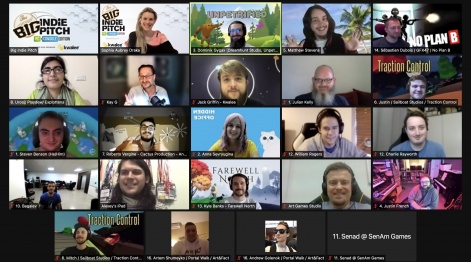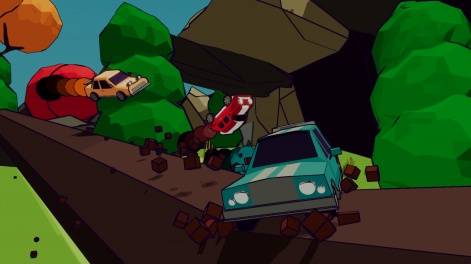The Big Indie Pitch is a regular event run by the makers of PCGamesInsider.biz. It sees indie developers engage in a speed-dating-style pitching competition for fame and those sweet, sweet promotional packages.
The event gives indies five minutes to pitch their games to a panel of press, publishers, and industry pundits. The judges then pick three winners and everybody gets valuable feedback.
The indie view
The Big Indie Pitch is getting bigger and bigger as we bring it to events all across the world. To give you an idea of what the event is like, who attends the events and the games on show, we've sat down with a number of past BIP contestants to offer their views.
Today, we're speaking to Mitch Lawrence from Sailboat Studios, who submitted Traction Control to The Digital Big Indie Pitch (PC+Console Edition) at Pocket Gamer Connects Digital #8 and sponsored by Kwalee and walked away as the runner-up.

PCGamesInsider.biz: Tell us a little about yourself and your indie studio. Who is in the team and what are their inspirations?
Mitch Lawrence: Sailboat Studios is a Canadian software studio that specializes in video game technologies. Of course, this means we get to make our own games, though we also serve clients who want to use gaming technology to improve their lives and businesses. Sailboat Studios is comprised of 5 people. Gabriel Mesquita is our CEO, he keeps the company running. Steven Callaghan is our company scribe, he handles copywriting, legal documents, and other wordy things. Jeff Buckingham is relatively new to the team, but he's been extremely helpful in business development. Justin Tijunelis is the other developer at Sailboat Studios, focusing largely on the service offering side of the company and has been incredibly valuable in adding networking and multiplayer features to Traction Control. I'm responsible for most of what remains surrounding Traction Control. I deal with asset creation game design and implementation. I consider myself lucky to be able to work on Traction Control full-time, and I couldn't do that without the support of the rest of the team.
Tell us about Traction Control that you pitched at the competition.
Traction Control is a physics-based arcade racing game where players do tricks and stunts to earn boost and speed. In the air, players have complete control over their car's orientation, and this control can be used to do spins and flips or to line up with a log to grind. None of the tricks are pre-determined, so each run and attempt is novel and unique. Traction Control is a skill-based game where players compete for the top spots on the leaderboard.
What do you think are the most unique and interesting aspects of Traction Control that gamers may never have seen before.
I believe what sets us apart is the completely physics-based trick system. There are no scripted spins, flips or grinds, and so each player can develop their own style, their own tricks, and their own strategies to make it to the top. There are no 'right' ways to play, but instead a set of simple tools that allow players to add complexity to their gameplay wherever they see fit, reaping the rewards for doing so.
Traction Control can be seen as something of a unique cross between downhill racing and Tony Hawk's trick based gameplay. What made you choose to create this type of game, and what do you think you bring that may not have been seen before?
Our game actually didn't contain a lot of the explicit freestyle sports inspiration that it has ended up adopting. Initially, it was a lot more like a racing platforming game. Cars were extremely fragile and small mistakes would cause a player into a fail-state. We knew the game was challenging, but we felt it was rewarding to finish levels because of their difficulty.
As we got better at the game, we started to appreciate the depth the mechanics offered to player expression and style. I believe it was Steve who first suggested an 'unlimited boost mode' effectively keeping track of all the tricks you do in a run. Grinding came later, but it was really always there. All we had to do to implement it was make a cylinder mesh, turn it on its side and set a friction value. Okay, not quite that simple, but pretty much. At that point, we knew the game needed to emphasize the skateboarding aspects because they offered the greatest depth and most replayability. We like to say that we set out to make a racing game but accidentally made a skateboarding game.
How did you come to choose the platforms that you would develop Traction Control for?
The main choice we made about the platform was that gamepad support needed to be front and centre. We are focusing on PC first, hosting on itch.io. Itch has been really great to us, and we'd recommend anyone starting out to consider it. For us, itch provided the simplest publishing process and allowed us to start publishing builds at a very early stage. This has provided us with a resource for feedback. We do plan on extending to Steam soon, though we have plans for more development and Steam integration before we are ready to start releasing pre-release builds there. While we're not currently pursuing console ports, it's something we'd all love to do for a version 1.x, following an official Steam release.
Looking at the studio a little more now. How hard is it to survive as an Indie developer?
It can definitely be difficult to stay afloat. It's not uncommon, from our experience anyways, for game studios to try and leverage their experience and work ethic into something 'safer' to support development. Of course, any start-up is risky, and lots of hard work, but I think games carry their own specific risks. Games not only have to work properly, but they need to be appealing in artistic and creative ways as well.
Are there any tips and advice you would give to independent developers out there who are just starting out?
I'd say that when designing and developing a game, it's important to leave some breathing room for the game to develop ideas on its own. Especially when working on a game for the first time, it can be difficult to really consider all the connections required to make all your ideas work together. You should be able to play your game a lot, and playing your game should inform you as to which features you add, or even need. Building as little as possible while playing as much as possible will help make sensible decisions about project scope, and will help you identify what your project is missing or what makes it special.

How did you find your experience pitching as a part of the Big Indie Pitch?
For us, it was really great. Operations went smoothly, we didn't really experience any sort of technical difficulties when it came to being in the right room at the right time. It was our first time pitching the game, so to walk away with a prize is very validating. Personally, I was glad it was online. It definitely made it more approachable for a first-time pitcher. All the judges and staff made us feel comfortable and allowed us to give the best pitch we could.
What do you feel you have gained from the experience, and what do you still hope to gain?
The biggest thing we gained from participating in the pitch was the chance to focus on what makes the game stand out, and really come to terms with the elevator pitch of your game. The tight time frame really had us trimming down the pitch to exactly what makes Traction Control interesting, and for us, that was a great exercise to do. It clarifies a lot of the high-level thoughts you have about the game. Participating in the pitch also provided us with avenues of communication to industry vets, which is great for us. We are new to game development, and being able to reach out to people who have been in our shoes is incredibly helpful.
What are your hopes for this game in the future, and do you have any plans for any future projects?
In terms of future plans, we have no desire to move on to a new project. At least, not yet. We plan to take the title at least as far as an official Steam release. This will mean new levels, cars, visual effects, optimization, and much more. While we are certainly proud of what we have been able to achieve in the first year of development, there is still lots to be done in terms of polish and we definitely aren't out of ideas yet. Traction Control is far from finished, but we're excited to keep working on the title until it is.
Want to show off your exciting new game? We host Big Indie Pitch events throughout the year, so make sure to regularly check our upcoming events page over on BigIndiePitch.com.










